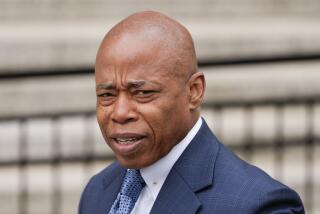John Edwards’ trial set to begin on campaign finance charges
- Share via
GREENSBORO, N.C. — In a federal criminal case that has the markings of sex, money, betrayal and a handsome politician’s fall from grace, former presidential candidate John Edwards’ trial for alleged campaign finance violations opens Monday in Greensboro, N.C.
Edwards is accused of accepting more than $900,000 in illegal contributions during his 2008 bid for the Democratic presidential nomination to pay the expenses of his mistress and hide the extramarital affair that, if revealed to voters, almost certainly would have derailed his campaign and shattered his public image as a devoted family man.
The former senator from North Carolina has pleaded not guilty to six criminal counts related to campaign finance violations. If convicted of all charges, Edwards faces up to 30 years in prison and $1.5 million in fines. Opening arguments are scheduled to begin Monday morning and the much-anticipated trial is expected to last at least six weeks.
Prosecutors contend that bills paid by two Edwards benefactors, Rachel “Bunny’’ Mellon, a banking heiress from Virginia, and the late Fred Baron, a Texas lawyer, actually were unreported campaign contributions designed to cover up his affair with Rielle Hunter, a campaign videographer who gave birth to his daughter.
“The charges against John Edwards in this case flow from his knowing and willful violation of the federal campaign finance laws during his campaign for the Democratic Party’s nomination for president,’’ prosecutors said in court filings.
Justice Department prosecutors contend this is a straightforward case of broken campaign finance laws:
“A federal candidate may only accept and receive a limited amount of money from any one individual during an election cycle, and he must truthfully report the money he accepts and receives,’’ the department said a trial brief.
Edwards’ defense team contends that the payments were not political donations, but gifts from wealthy friends to help address a personal issue unrelated to the campaign. His lawyers suggest that Edwards did not know about the money from Mellon and Baron.
“The government assumes that Mr. Edwards knew about the monies; the evidence will prove otherwise,’’ his attorneys said in a court filing.
Edwards’ lawyers contend that the government’s case requires the jury to accept a novel interpretation of a campaign finance law that “has never been the basis of criminal or even civil liability in the statute’s history.’’
Campaign finance experts have said that the violations at issue have been previously handled as civil penalties, resulting in fines and payback requirements for the offending candidates.
“This case is significant both legally and politically,’’ said Kenneth Gross, a Washington ethics lawyer. “This is the first criminal case dealing with an excessive gift, particularly a gift not ever going to a campaign, and spent for purposes seemingly unrelated to a campaign.’’
Citizens for Responsibility and Ethics in Washington, a watchdog group that generally supports the Justice Department against politicians charged with corruption, took the unusual step of criticizing the prosecution of Edwards. The group contends that the payments were gifts, not campaign contributions, noting they continued after Edwards ended his campaign.
The group cited a 2002 Federal Election Commission decision where six commissioners unanimously agreed that a loan made to a congressman to help defray the costs of his divorce was not a campaign contribution because the donor and the politician “had a preexisting personal relationship.” The same precedent should apply to Edwards, the group said, because the money came from friends.
“Sen. Edwards’ conduct was despicable and deserves society’s condemnation, but that alone does not provide solid grounds for a criminal case,” the group said in a statement last year.
The trial is starting about a year and a half after Edwards’ wife, Elizabeth, died of cancer.
It’s unclear whether Edwards, who built a lucrative career as a personal injury lawyer, will take the stand. His defense team includes prominent Washington lawyer Abbe D. Lowell.
Edwards in August 2008 admitted to the affair with Hunter after first denying it. At the time, he denied fathering Hunter’s child. Then, in January 2010, he admitted he was the father of Frances Quinn Hunter.
A key witness is expected to be Andrew Young, a former Edwards campaign aide who falsely claimed he was the father of Hunter’s child to protect his boss. Young later wrote a tell-all book, “The Politician.’’
The defense is expected to attack Young, saying in a trial brief that the payments by Mellon and Baron covered Hunter’s personal expenses “and, much more so, the Youngs’ personal expenses, such as construction of their dream home, not Mr. Edwards’ expenses.”
Hunter is expected to be called to the stand. Baron is dead. Mellon, who is 101, is not expected to testify, but her attorney may be called as a witness. The exhibits also include voice mails left by Baron and notes from Mellon to Edwards.
Edwards’ eldest daughter, Cate, is on the defense witness list. The case is before Judge Catherine C. Eagles, who was appointed to the bench by President Obama.
Follow Politics Now on Twitter
More to Read
Get the L.A. Times Politics newsletter
Deeply reported insights into legislation, politics and policy from Sacramento, Washington and beyond. In your inbox twice per week.
You may occasionally receive promotional content from the Los Angeles Times.











